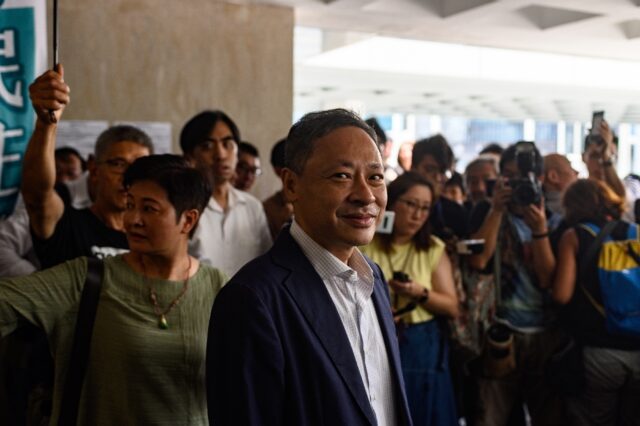Once the Hong Kong government’s go-to constitutional law expert, Benny Tai is now regarded by authorities as the “mastermind” who had conspired to commit subversion in the city’s largest security case.
He received a medal of honour in 2001 for civic education around the Basic Law, Hong Kong’s mini-constitution which has governed the former British colony since it was handed back to China.
More than 20 years later, prosecutors denounced the 59-year-old as the “mastermind and instigator” behind the actions that led to Hong Kong’s largest national security case, which reached a verdict on Thursday.
Fourteen out of 16 who insisted they were innocent were found guilty, while Tai — along with 30 others — had already pleaded guilty two years earlier.
But he still featured prominently throughout the 300-plus-page judgement issued Thursday, which detailed Tai’s plan to “acquire a ‘constitutional weapon of mass destruction’ in destabilising the existing political system”.
“(Tai’s) aim and purpose was to use the Scheme to undermine, destroy or overthrow the existing political system and structure of Hong Kong,” it said, referring to him as “D1” — the first of 47 defendants.
He — along with the others convicted — will be sentenced later this year for subversion under Hong Kong’s national security law imposed by Beijing in 2020.
It was enacted after millions took to Hong Kong’s streets at the height of massive and at times violent pro-democracy protests in 2019 to call for more autonomy from Beijing.
Authorities quashed the protests, but Tai developed a strategy to unite Hong Kong’s disparate pro-democracy groups into a coalition to seek a legislative majority.
They would then veto government budgets, force it to accede to demands raised by protesters in 2019 and ultimately push for the city’s leader to step down, prosecutors said.
Tai had argued the move fell within the Basic Law, which enshrines the city’s unfulfilled right to universal suffrage.
He pleaded guilty at pre-trial hearings in June 2022.
Days later, the government stripped him of the medal of honour.
Shift to activism
Born in 1964, Tai studied law at the flagship University of Hong Kong at a time when the UK and China were entering the final phase of negotiations on the city’s handover.
His thesis examined Beijing’s “One Country, Two Systems” political framework that allowed Hong Kong to preserve its capitalism, a common law system and certain civil liberties.
After graduating, Tai assisted Martin Lee, founder of Hong Kong’s Democratic Party, to draft the Basic Law, before leaving for postgraduate studies in London.
For more than two decades after his return, he was a celebrated law professor and a well-respected scholar sitting on the government’s civic education committee.
But as Tai pursued his idea for a universal suffrage sit-in, he shifted more towards public activism.
He spearheaded the Occupy Central movement in 2014, where hundreds of thousands of Hong Kongers staged a 79-day sit-in around the city’s Central business district, calling for universal suffrage.
They faced 87 rounds of tear gas and authorities rejected their demands.
“I shall never give up and I will definitely continue to pursue democracy for Hong Kong,” Tai told the court after being convicted on incitement and public nuisance charges in 2019.
A symbol
Soon after his release on bail in August 2019, as pro-democracy protesters were besieged by police at a local university, candidates avowing their cause recorded a landslide win in District Council elections.
Tai, a self-described “bridge-maker” among the democratic movements, saw an opportunity to secure a legislative majority.
“Elections… cannot change the undemocratic nature of the political system,” he wrote in his book “Love and Peace: The Unfinished Journey of Resistance”.
But “they can slow down Hong Kong’s fall into full-fledged authoritarian rule”.
Activist Raphael Wong said Tai wanted “to absorb, coordinate and integrate various opinions from the vast political spectrum of the democratic camp”.
Today, many activists have either been arrested or left the city.
But within the withered pro-democracy camp, Tai is a symbol of “Hong Kong’s sufferings”, said Ho Chi-kwan, a prominent feminist leader who now lives in Taiwan.
“The twists and turns in his life are an epitome of the fate of Hong Kong,” she told AFP.

COMMENTS
Please let us know if you're having issues with commenting.